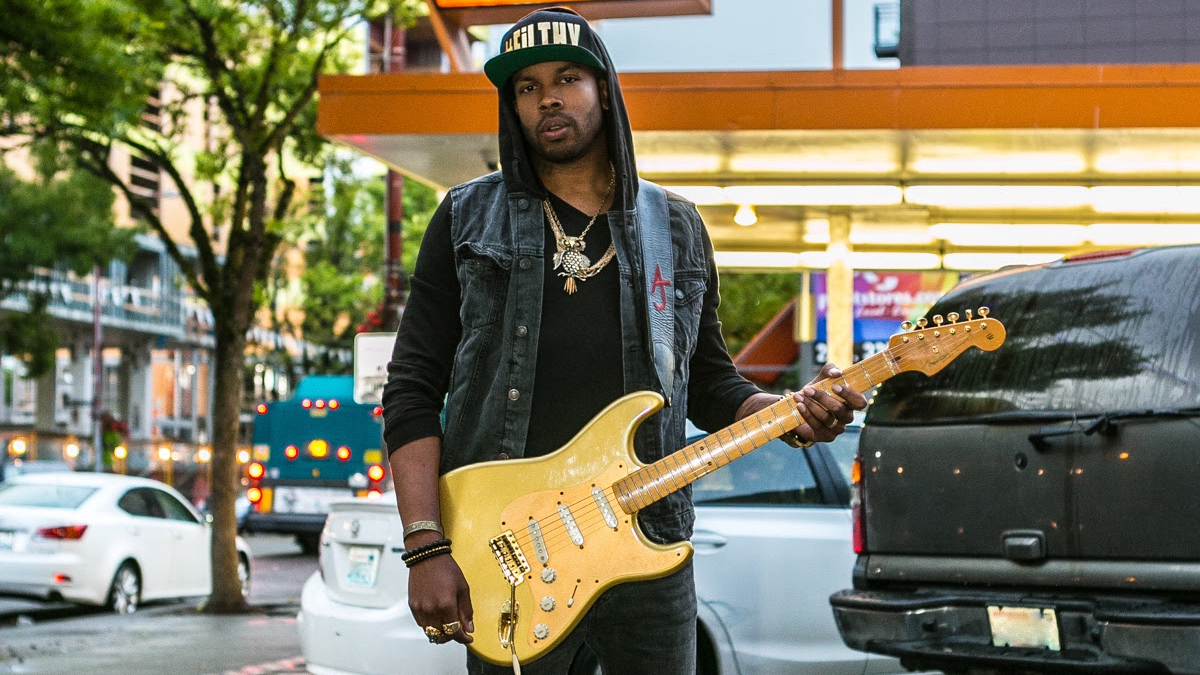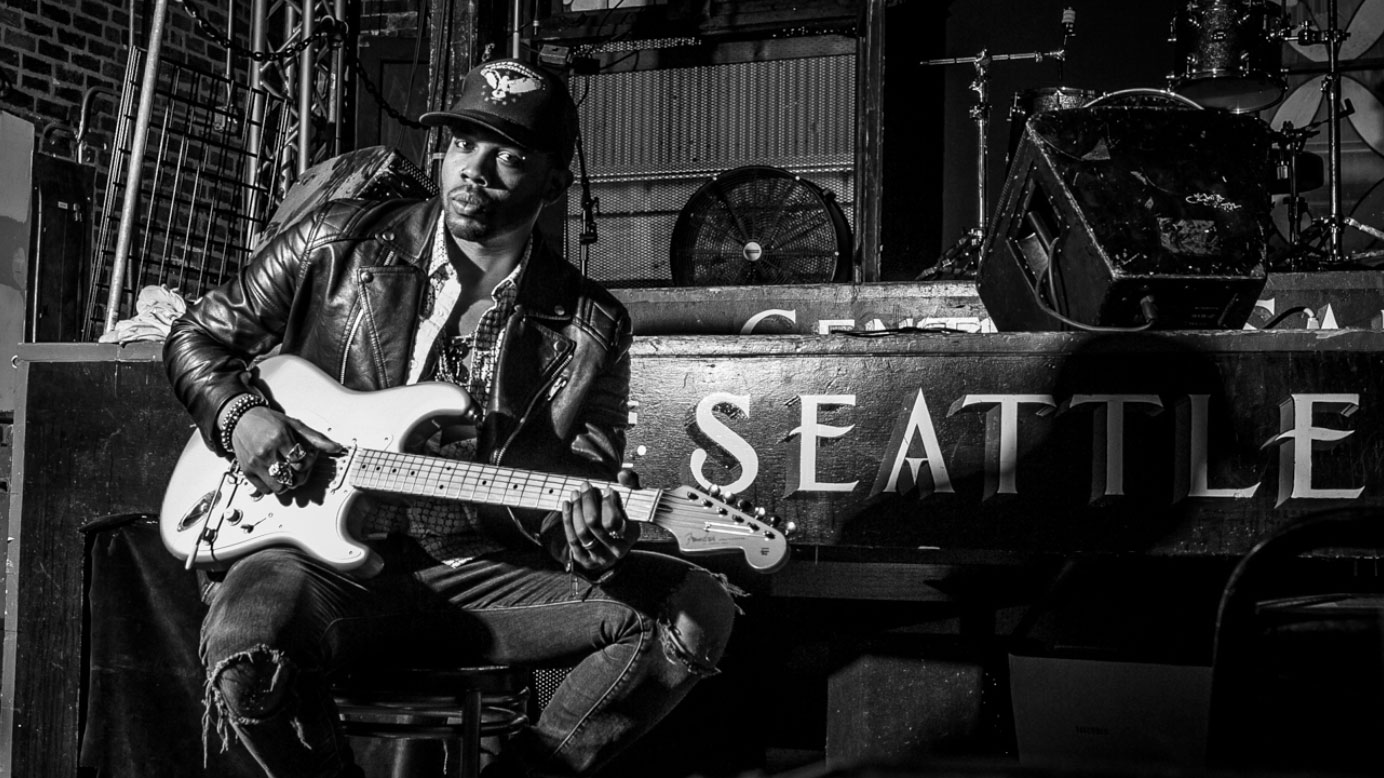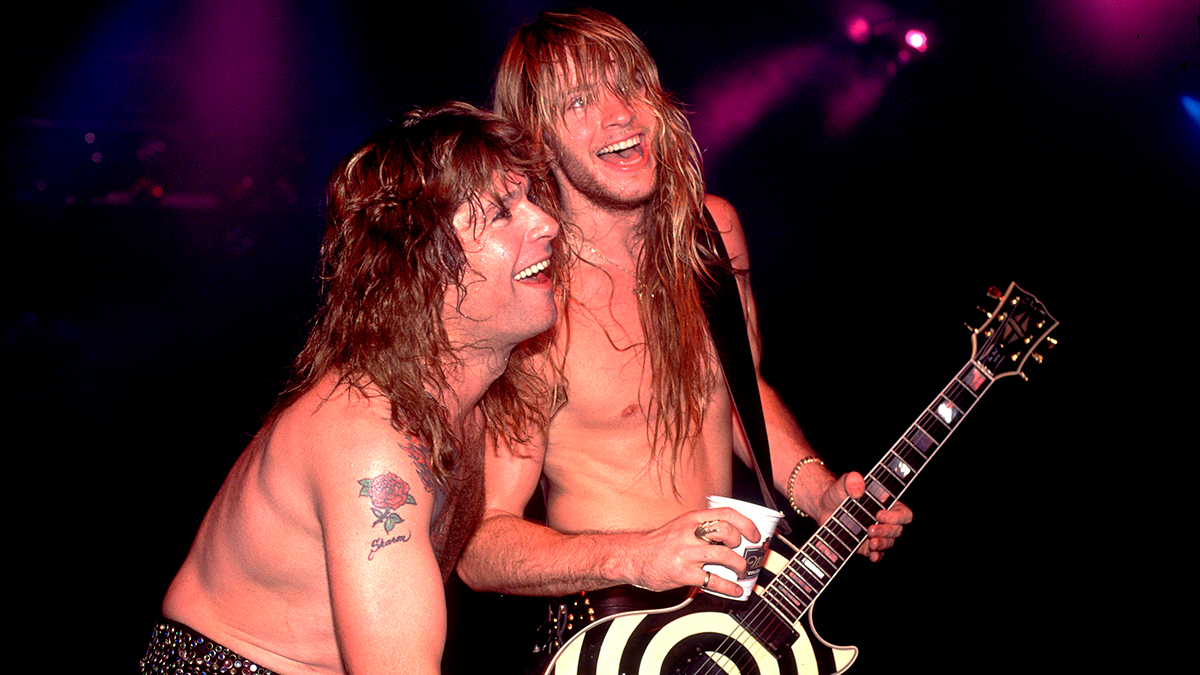Ayron Jones: "While there were all these holes to be filled in my life, the void was ultimately filled by my love of guitar"
The rising rock guitar phenom on channeling the Seattle sound, attending Jimi Hendrix’s middle school and how a chance encounter with Sir Mix-a-Lot changed the course of his career

Blending heavy rock, blues, grunge, hip-hop and soul with searing lead guitar work and serious tone, Ayron Jones has burst out of Seattle to become one of the most exciting guitarists of the past few years. And Guitar World has certainly taken notice.
In addition to dropping a series of singles in 2020, including the incendiary Take Me Away and the whisper-to-a-scream Spinning Circles, he also took part in the Museum of Pop Culture’s all-star tribute to Alice in Chains, where he tackled Heaven Beside You and Down in a Hole, the latter with Duff McKagan and Shooter Jennings.
Now, Jones is releasing his new studio album, Child of the State, which features both Take Me Away and Spinning Circles, and delves deep into his difficult and embattled childhood, which includes absent parents and being surrounded by drug addiction.
“For me,” he says, “Child of the State is about finding my identity through music and my passion for guitar and my love of life.”
Jones sat down with GW to talk about that music and passion for guitar in this exclusive interview.
Child of the State touches on some pretty intense, and personal, subject matter.
“The record is me trying to let people into the mind of someone in my position. There's a lot of kids out there that have been abandoned – and not just in the US, but in the world – and have had to really face a lot of hardship and an uphill battle to find success, you know?
All the latest guitar news, interviews, lessons, reviews, deals and more, direct to your inbox!
“My experience definitely had its hardships and its hiccups and challenges, but more than anything, I think the hardest part for me was finding my identity. Because your parents really define who you are as an individual, especially with the stories and the legacy of your family. When those links are missing, you have a hard time figuring out who you are, where you come from, what your background is.”
We’ve featured a few tracks from the new album on Guitar World, but the one in particular that seems to be a standout is Take Me Away. Can you talk about that one?
No matter where I had come from, I knew that my guitar could take me far and wide to places that I'd never seen and help me elevate past whatever hardships I've been through
“Take Me Away just kind of epitomizes my whole story. And at some point, I think music became the catalyst for that story. While there were all these holes to be filled in my life, I think the void was ultimately filled by my love of guitar. It became my portal to the outside world. No matter where I had come from, I knew that my guitar could take me far and wide to places that I'd never seen and help me elevate past whatever hardships I've been through. Take Me Away really captures that.”
Speaking of your guitar, the sounds you achieve on this record are really great. You have such a thick and present tone, even when you crank up the gain. What gear did you use to record Child of the State?
“I used a multitude of different guitars and amps. My guitar setup was a bunch of different Stratocasters, from American to Mexican to HHS to HSH. I played some Gibsons – a couple SGs – as well. Amplifier-wise, I used a Hiwatt, I used a Marshall. I was going through 4x12s, and at times I was doing stereo.
“Ultimately, what I was attempting to do was capture that live sound that I’ve become known for in my career and bring that to a record. And it can be really difficult to emulate that live sound in a studio and put it on a record. But when I play live, I play through a stereo setup, so it was really important for me to try to capture that. That's basically what I constructed the sound of this record around.”
You’re very vocal and proud about your Seattle roots – the first song on Child of the State is titled Boys from the Puget Sound. Obviously the region has such a rich rock musical history, from Jimi Hendrix and Heart to the grunge explosion. How has that lineage influenced you?
If you're a guitar player in Seattle, it's impossible for you to have not been influenced by the greats from here, starting from Jimi Hendrix
“I think if you're a guitar player in Seattle, it's impossible for you to have not been influenced by the greats from here, starting from Jimi Hendrix. But I didn't really think about the Seattle sound so much when I was doing the record. I definitely was trying to put it on there, but what I didn't realize then was it was just in me from having had experiences playing with a lot of these cats who were pioneers of this scene – playing on records with Duff McKagan and working with cats like Barrett Martin. Those guys helped me perfect that sound and what it means to have that sound.
“Like, if you listen to the record, you'll notice a lot of Leslie sounds all over. That’s a Seattle thing. Or, I tried to do the high/low thing where there’s really basic, simple verses and then heavy choruses. In terms of the influence of the Seattle sound, I think I would have done a disservice to myself and everyone else had I come from this scene and not represented the sound in the best way possible.”
Are there any Seattle-based artists you were particularly influenced by when doing this record?
“I can't say that there was one particular band, but I will tell you that when I was working on this record I really studied a lot of Audioslave, and I listened to a ton of Nirvana. I really wanted to capture that energy, you know what I mean?
“And the best way to do that, I think, especially when you're considering the Seattle sound, is in the contrasts – the verse/chorus thing. It's like, there might just be a bassline running through that first verse, and then all of a sudden you come crashing into the chorus with those heavy double-stacked guitars, you know? That’s the sound. So I can't say it was one band or guitarist, but the sound is definitely prominent.”
Earlier in your career, another Seattle figure you worked with who is somewhat outside of the rock realm is Sir Mix-a-Lot. What was your musical relationship like with him, and what did he contribute to your development as an artist?
The reason that I decided to make all this happen today really has a large part to do with Sir Mix-a-Lot instilling this idea in me that I could be something besides just a bar player
“He was my big brother, man. Honestly, before I met Mix I was playing bars and clubs – in fact, when I met him I was playing at this little club, it was like a dive bar, called the Rat and Raven up in the University District. There’s like 10 people there and he walks in and decides that he loves my sound and wants to produce my first record. That right there was my first real shot at making a legitimate record.
“A little bit of what he brought to the table for me was that hip-hop element that you can really hear throughout my music. Also, he instilled a confidence in me that I didn't have before. To have someone like Sir Mix-a-Lot telling you that you can be something? That's a big deal for a kid who's just trying to make it.
“Honestly, the reason that I decided to make all this happen today really has a large part to do with Sir Mix-a-Lot instilling this idea in me that I could be something besides just a bar player.”
Who were your primary guitar influences growing up?
“I think my primary influence had to be Jimi Hendrix. I went to the same middle school as Jimi, I'm from the same neighborhood… it was impossible to have lived here as a guitar player and not have that influence. And I think a lot of guitar players that come from Seattle have a little bit of that – look at Jerry Cantrell, look at Mike McCready. There's a plethora of different guitar players that come from this region and I think Jimi was the number-one influence on a lot of them.
“And then I dove into some people that Jimi was influenced by, like Guitar Shorty, and there's obviously a lot of Muddy Waters in there. But then there’s also Stevie Ray Vaughan and Steve Vai and so many different guitar players. But I think Jimi was probably the primary one.”
You’ve had the opportunity to play on the same stages with so many great artists, from BB King and Jeff Beck to Run-DMC and Guns N’ Roses. What have those experiences been like for you?
“They've been amazing learning experiences. Every single person I've opened for, I've taken little things from them to help add and build on my own career as an artist. And it's pretty humbling. When you're coming out and you're an indie artist… I'm running out here in a minivan, bro, you know? I’m chasing tour buses in minivans. But here you are. And the opportunity to work with some of these acts that you grew up listening to, and that are some of the most prominent guys in the world, it’s an incredible thing. It's a large reason that I’ve been able to do what I do up to this point now.”
Guitar-driven rock doesn’t occupy the same central space in the musical landscape that it did in the days your idols and influences were coming up. How do you approach playing this style in the 21st century?
“I think part of the luxury of being born as a millennial in this time period is that I kind of get where people's ears are. Mind you, I'm at the older end of the millennial spectrum, but I did grow up in the time period that created the music that people are listening to today.
Part of what I put upon myself was to try to create a sound that was going to cross genres
“So part of what I put upon myself was to try to create a sound that was going to cross genres. I'm not going to go too hard rock. I'm not going too poppy. I'm grabbing all these elements that I think that people love in these different genres and then putting it in into the rock genre. And I’m doing it with the hope that people who are into other styles and that don't listen to rock will come in, and this music will introduce them to a world that they maybe haven't gotten to know yet because of the time period we’re living in.”

What advice would you give to a young guitarist coming up now and trying to get to that same point?
“Um… don't be a dick? [laughs] Seriously, though, be really pleasant to work with. And also, always approach your situation with an empty cup. Approach it with confidence, but also with an empty cup. There's a place for the ego, and that place is on the stage. But as soon as you step off the stage, you should always be willing to learn and to progress, and to allow others to help guide you that way.
“I think that's the biggest lesson I learned in getting to where I'm at today. I know there's people out there that will complain and say that there are certain artists that shouldn't be here, and this and that, but a lot of artists actually got here because they had an open-cup mentality when it came to learning and figuring out how to make their way through this industry.
“Because as you know, it's not just about the music itself, and it's not just about how talented you are. It's about the relationships that you create, too. And there's no way for you to fill your cup if it's already full, man. So you gotta have that empty cup mentality and always be willing to learn and grow.”
- Child of the State is out now via Big Machine/John Varvatos Records.
Rich is the co-author of the best-selling Nöthin' But a Good Time: The Uncensored History of the '80s Hard Rock Explosion. He is also a recording and performing musician, and a former editor of Guitar World magazine and executive editor of Guitar Aficionado magazine. He has authored several additional books, among them Kurt Cobain: Montage of Heck, the companion to the documentary of the same name.

